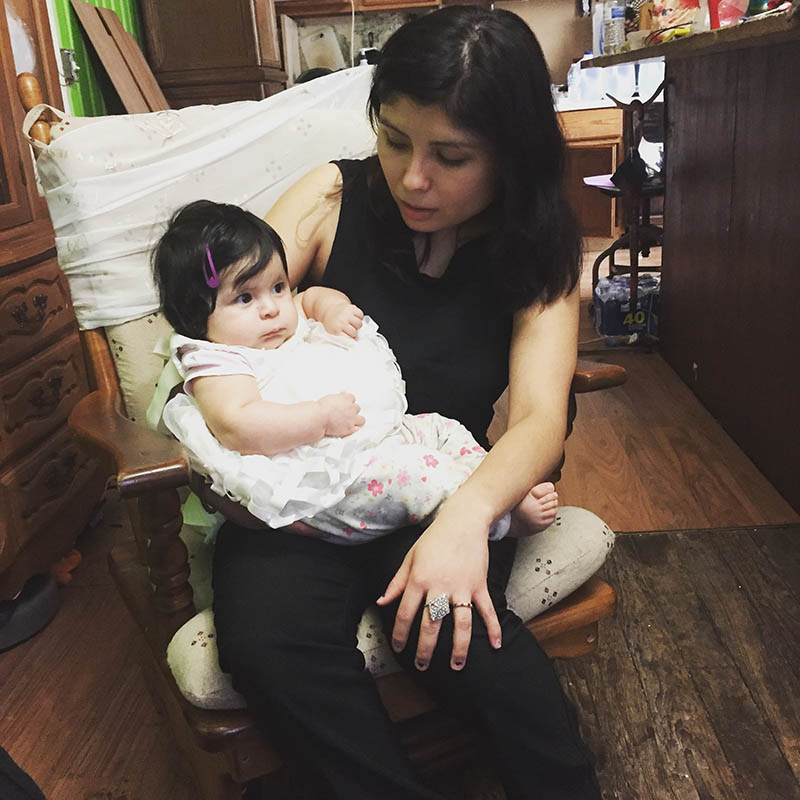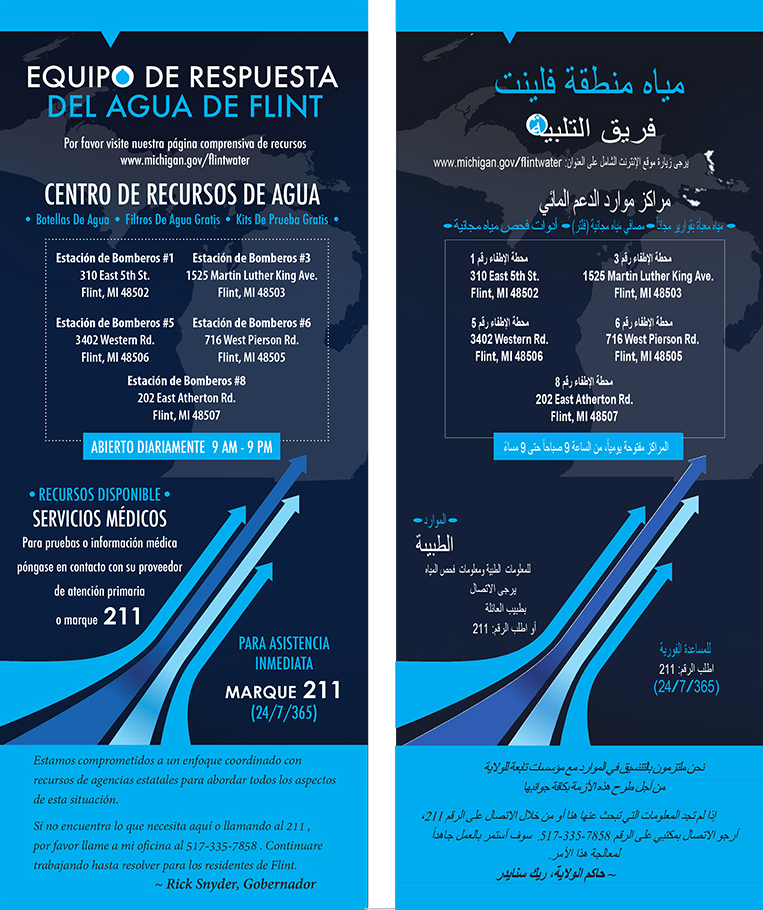What government owes Flint’s poisoned immigrant community

Yaquelin Vargas knew last year she needed to stay hydrated while pregnant. But the tap water at her home on Flint’s east side made her ill. “Keep drinking it,” she remembered her doctor telling her. “It will help the baby.”
It was Oct. 1 last year when Flint residents were told to stop drinking the city’s water, after the state belatedly confirmed it was poisoned by lead leaching from pipes into the water supply. News reports and government directives rolled out over the weeks and months that followed. But for a variety of reasons, Vargas and her father, Sergio, said they did not become aware of the threat until January, only a few weeks before Yaquelin Vargas’s infant daughter, Lydia, would be diagnosed with lead poisoning.
“I feel responsible for hurting my daughter,” Vargas says now. “We had no idea.”
Stories like Vargas’s are not uncommon among Flint’s Latino immigrant community of roughly 4,000, a group that includes nearly 1,000 undocumented residents. In a city where delayed revelations about lead-poisoned water ignited international outrage, perhaps no corner of Flint learned of the threat posed by lead later than its Spanish-speaking residents.
The reasons are complex, as are the moral questions, including this one, surely to be a source of fervent debate in a nation riven by immigration politics: Does the government have a duty to take extra measures in an emergency to reach immigrant communities that may be wary of, or actively avoiding, government help? Activists say the missed connections in Flint also carry lessons for policymakers, first responders and community activists themselves about how to more effectively reach hard-to-reach groups during a crisis.
In Flint, National Guard members distributed Spanish-language flyers door-to-door after the lead crisis broke publicly. But some wary residents, on edge from stepped up federal deportation raids, either didn’t read them or didn’t trust the information provided. More alarming, community activists say, were inaccurate early announcements that Flint residents would need to show photo identification to receive free water bottles. There were also confusing, inaccurate rumors about why the water tasted bad. The dearth of local Spanish-language media didn’t help.
And many immigrants, the undocumented in particular, live in an information blackout surprising to many in the broader community. As community organizers, churches and other advocates worked to fill the communication gap in late January, they learned that some local Latinos had only learned of the water crisis from relatives in Mexico, who saw television reports broadcast from Flint.
Sapphyre Cross, who runs a Spanish-language radio show in Flint, said she was wary last fall of sounding false alarms about the foul-smelling water to a community already worried about federal enforcement efforts.
“I didn’t want to spread mass hysteria if I didn’t have my facts straight,” said Cross, who co-hosts “The Pete Mata show” on Sunday mornings on WWCK FM-105.5. “Once it was confirmed by the governor’s office, we got the word out. But if I had been wrong, they would have had my head on a platter.”
“I feel terrible. I apologized to the community for not telling them sooner.”
A tragic silence
For Yaquelin Vargas, life events conspired to leave her cut off from the larger world.
Until recently, the journey of this 21-year-old native of Nueva Rosita in Coahuila, Mexico, had resembled the American dream.
Vargas and her father, now American citizens, moved to Flint six years ago after successfully bidding on an affordable home. Three years ago, while enrolled at Genesee Early College, she won an American GI Forum beauty pageant. She was taking classes at UM-Flint and interning at the Hurley Medical Center to become a pediatric nurse.
Then her father became too ill to work, and Vargas quit her studies to take care of him. In their simple home, there is no radio or television.
They knew E.coli bacteria had been found in their tap water, and they were told to boil it. She said they were then told they could drink the water if they used a filter. But throughout Yaquelin Vargas’s pregnancy — and after Lydia’s birth, on Sept. 12, as the infant breastfed — mother and grandfather said they never caught wind of lead in the water.
It was not until early January, when Lydia was not tracking the movements of her mother’s finger, that Yaquelin Vargas said she suspected something was wrong. It was not until late January, when a volunteer from nearby St. Mary’s Catholic Church knocked on their door, that the Vargas family said they were first told to completely abstain from using tap water.
Flyers sent, but not read
January turned out to be a busy month for community outreach in Flint. On Jan. 5, Gov. Rick Snyder finally declared a state of emergency in Flint, as the city’s story splashed across front pages worldwide. Six days later, the Michigan Department of Technology, Management and Budget printed 15,000 handbills in Spanish with relevant information about the water crisis, according to state public information officer Ron Leix.
Once the emergency was declared, the state acted quickly to make free bottled water and filters available to Flint residents. But two strategic decisions hindered outreach to some in the Latino immigrant community.
The state made the seemingly reasonable decision to deploy National Guard, the State Police and Red Cross workers to canvass neighborhoods with bottled water for drinking and bathing, all in uniform and strangers to most residents. Flint advocates for Spanish-speaking residents said many were afraid of these uniformed visitors; afraid of being apprehended and deported for being in the U.S. illegally, or leery because of the legal status of someone in their household. Many chose not to respond to knocks on their front door.
“The timing of the water distribution in Flint was unfortunate because it came at the same time as the Obama administration stepping up raids for folks with recent removal orders,” said Susan Reed, managing attorney at the Michigan Immigrant Rights Center. “We in the advocacy community were aggressively telling people — undocumented or not — not to open their doors to people without search warrants.”
Second, some Flint fire stations, which were among the first water pickup locations, initially asked residents for government-issued photo ID in exchange for free water when they opened in January.
Eventually, fire stations stopped asking, but not before reports about photo IDs spread quickly among immigrant families. On Jan. 22, Flint resident Tina Vasquez tweeted that “undocumented folks are reporting that they are being asked for a government issued ID in order to get water at distribution centers.”
David Kaiser, a spokesperson for the Michigan State Police, told Yahoo News the following day that photo ID “is not required, it’s just requested” and that residents’ addresses were only being tracked to ensure that free water, filters and supplies were actually going to residents of Flint and to get a better handle on where help was most needed in the community.
But some didn’t get the message. At Fire Station no. 1 — one of fire stations turned into water distribution centers — a National Guardsman required photo ID before handing over a case of bottled water to each car that lined up.
Ron Leix, a spokesman for the State Police, confirmed miscommunication prompted at least one fire station to ask for ID. The state issued a press release on Jan. 22 confirming that photo ID was not required.
“During a disaster is not the time to think about someone’s immigration status,” Leix told Bridge. “We heard rumors on social media that (the ID request) was being used as an opportunity to find undocumented workers. But we tried to debunk that. We sent out a press release immediately. Still, it was a concern.
“Every disaster is new. You learn things from every disaster, from outreach to logistics.”
As water donations picked up at local fire stations, members of the Michigan National Guard were going door to door to help residents.
Thomas Vega, staff sergeant and public information officer for the Michigan National Guard, arrived in Flint on Jan. 14 to begin overseeing the outreach effort. Within days, guard members began delivering palm cards printed in English and Spanish with information on nutrition, free water tests and instructions for using free filters. They left information sheets on doors when no one was home or attached them to the water bottles themselves.
“They were definitely getting information out into the community,” Vega said. “But we also learned troubling information that the undocumented folks were afraid to come to their door. We heard rumors circulating through the community spread by activists that the National Guard was going to turn people’s names over to immigration authorities and have them arrested. Those rumors were false and, as a Hispanic myself, I took them personally.”
“Most of the time someone sees one of us in uniform and they think that’s someone they can trust,” Vega said. “The majority of the people in Flint wanted us there, to help. We played a small role, but in my mind it was one of the most important roles.”
A boost from TV
The difficulty in reaching Flint’s Spanish-speaking community did not receive wide publicity until late January, with coverage by local television reporter Natalie Zarowny on ABC12 WJRT. and
“I’m not here legally. And I’m always scared that they’ll arrest me, and then deport me,” a single mother, identified only as Lucia, told Zarowny.
Community organizers met a family who learned of the danger after getting a call from relatives in Mexico City who had seen news of the Flint water crisis on Univision.
At Our Lady of Guadalupe in northern Flint, parish member and attorney Victoria Arteaga told Bridge she encountered “a few dozen families who came to us and said they didn’t know” of the water crisis. Most of the written information about the water crisis that had reached the church was only written in English, “so we translated it ourselves,” she said.
“When the crisis hit, I went to Guadalupe for help,” said Maricela, an eastside resident, who asked to be identified by her first name only. “I trusted them. They were compassionate in those first days and said ‘We’re gonna take care of you.’ Unlike the fire stations, the church didn’t set a limit on how much water I could get. We have four people in our house and needed more than one case of water a day.”
That weekend, January 23-24, community volunteers, alarmed by the television report, set out to knock on doors and spread the word among Spanish-speaking residents about the danger of drinking the water. Cross, the radio host, said that’s how a Spanish-speaking volunteer from St. Mary’s Church met Yaquelin Vargas.
Juani Olivares, who chairs the Genesee County Hispanic/Latino Collaborative, an advocacy group, estimated that 95 percent of the people that volunteers encountered that weekend were unaware lead had contaminated Flint’s water supply or that the lead-poisoned water posed a health risk, particularly to children.
“We realized we needed to do something because the problem (of people not knowing) was bigger than we were told,” Olivares said.
The impact was immediate. Deacon Paul Donnelly, of St. Mary’s Catholic Church, was interviewed by reporter Natalie Zarowny and used his Channel 12 airtime to tell viewers they could get water from the church without identification. Bookkeeper and secretary Kathy Tomczyk said she witnessed “an explosion” of people on Thursday morning who needed cases of water to drink and bathe themselves.
“We’ve been taking care of them ever since,” said Tomczyk, who adds that the need for more bottled water is even is greater now than it was in January. “You don’t have to be Catholic to come here and get water. We don’t care about your skin color, your nationality, or your sexual preference. These are all God’s children.”
Truckloads of donated water pallets have arrived at St. Mary’s from all across the country, including Rhode Island, Virginia and Kansas. And still, it’s not enough. St. Mary’s gave out 1,054 cases of water one week in early May, said Tomczyk. She said she expects those numbers to increase now that three fire stations are no longer distributing water.
Lessons learned
How could the city and state have done a better job of reaching out to Flint’s undocumented community at the height of the water crisis? Advocates say that those responding to the lead crisis in Flint can learn lessons from elsewhere in the country.
Henry Fernandez, a senior fellow at the Center for American Progress, a progressive public policy research and advocacy organization, lauded how New York City Mayor Michael Bloomberg’s administration reached out quickly to that city’s undocumented immigrant community when Hurricane Sandy hit in 2012.
Even before the hurricane reached the city, the government released an online guide in Spanish and other languages answering questions about disaster assistance. The first question: “Am I eligible for any disaster assistance if I am undocumented?” Yes, the guide answered, and listed specific city, state and federal services available to them.
“They were very engaged,” Fernandez recalled. “They had the infrastructure in place, the people in place, and pathways for this to be done. When Hurricane Sandy hit New York, it caused a major crisis that hit people both who were undocumented and who weren’t. The way Bloomberg handled it was consistent with New York City’s overall strategy of embracing and welcoming immigrants, and making sure they’re safe. But it’s really important to lay that groundwork beforehand.”
A law that guarantees government officials won’t ask for photo ID during a crisis would also help, said Ryan Bates, executive director of Michigan United, a nonprofit activist group. California has such a law, and Bates said he hopes to convince lawmakers to introduce such a bill in Michigan.
Bates said he believes ID was initially required at Flint fire stations because officials were more concerned that residents would take commercial advantage of the handouts rather than use them for daily living, or that people would come from outside Flint to collect free water.
“There’s an unfortunate gut reaction from public officials that folks in communities like Flint are suspect. We should treat people as victims who need help.”
Fernandez said the outreach effort in Flint shows that the government needs to take a broader approach to reaching immigrant or non-English-speaking communities. Rather than relying so heavily on the National Guard going door to door, he said that including schools in the outreach effort would have helped disseminate health alerts more effectively.
When President Obama introduced his 2012 Deferred Action for Childhood Arrivals (DACA) legislation commonly known as the “Dreamers Act,” Los Angeles public schools sent home letters with each Latino immigrant student explaining how family members could apply.
“We often say that immigration reform could bring people out of shadows,” Fernandez said. “But people in the shadows are often already very connected to government, through local schools.”
Susan Reed, the immigration lawyer, said now that lead poisoning is being documented, it’s imperative for Michigan to expand Medicaid eligibility to include not just children who are U.S. citizens but all Flint children, including the undocumented or those holding Green Cards. Under current law, a noncitizen must have a Green Card for five years to be eligible for Medicaid.
“We haven’t seen clear communication from the state as to the health status for noncitizens,” Reed said. “How do we ensure that folks who don’t have status continue to have access to monitoring and intervention? They should have that after being poisoned by lead. They should be certified as victims.”
But Anna Heaton, the governor’s press secretary, responded that it’s federal law that prevents undocumented immigrants from enrolling in Medicaid.
“This population most often seeks health care from free clinics and federally qualified community health centers, of which there are several in Flint,” she said.
“We are working with those locations as well as with charitable and religious organizations to encourage blood lead level testing and to ensure resources exist for follow-up health care. If more resources are needed in the future, we will work with these organizations to address those needs.”
See what new members are saying about why they donated to Bridge Michigan:
- “In order for this information to be accurate and unbiased it must be underwritten by its readers, not by special interests.” - Larry S.
- “Not many other media sources report on the topics Bridge does.” - Susan B.
- “Your journalism is outstanding and rare these days.” - Mark S.
If you want to ensure the future of nonpartisan, nonprofit Michigan journalism, please become a member today. You, too, will be asked why you donated and maybe we'll feature your quote next time!


 Like many in Flint's Latino immigrant community, Yaquelin Vargas said she didn't learn until late January that Flint’s drinking water was lead poisoned. Vargas, a U.S. citizen, said she drank tap water while she was pregnant, and as she first began breastfeeding Lydia, now 8 months old, who suffers from lead poisoning. (Bridge photo by Jacob Wheeler)
Like many in Flint's Latino immigrant community, Yaquelin Vargas said she didn't learn until late January that Flint’s drinking water was lead poisoned. Vargas, a U.S. citizen, said she drank tap water while she was pregnant, and as she first began breastfeeding Lydia, now 8 months old, who suffers from lead poisoning. (Bridge photo by Jacob Wheeler) >
> On January 11, the government began delivering palm cards on water precautions written in Spanish and Arabic to homes in Flint.
On January 11, the government began delivering palm cards on water precautions written in Spanish and Arabic to homes in Flint. A television report on efforts to reach Flint’s Spanish-speaking community about lead-poisoned water by Natalie Zarowny of ABC12 led to a flood of help. (Courtesy photo ABC12 WJRT)
A television report on efforts to reach Flint’s Spanish-speaking community about lead-poisoned water by Natalie Zarowny of ABC12 led to a flood of help. (Courtesy photo ABC12 WJRT)